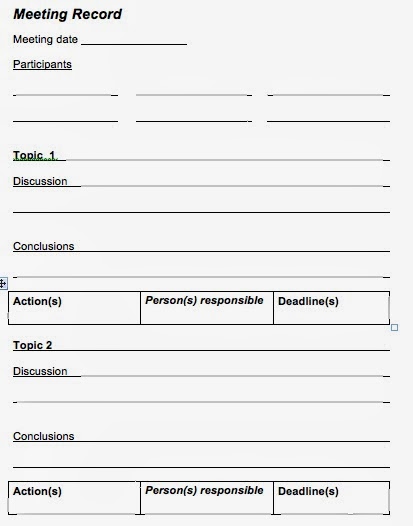 Never end a meeting without taking time to work on improving future meetings. You do this by discussing what went well and what could be done to make the next meeting better. Often when meetings are running late, you may feel their isn’t time for evaluation. Resist the urge to end the meeting without evaluating it.
Never end a meeting without taking time to work on improving future meetings. You do this by discussing what went well and what could be done to make the next meeting better. Often when meetings are running late, you may feel their isn’t time for evaluation. Resist the urge to end the meeting without evaluating it. Evaluating the meeting will help to improve future meetings!
When all are involved in discussion about the meeting before it ends, everyone will start to recognize those things that make a meeting worthwhile. Also discuss ideas to improve future meetings. Then keep doing what is working and stop doing what is not working.
Evaluate overall meeting effectiveness
Start the evaluation process by asking “What was most valuable about this meeting?” Wait for answers. Long pauses after a question give people time to think about their responses. Many times in meetings I have observed the meeting facilitator ask a question and then go on quickly when there are no immediate answers.
You can follow this question with “What happened during the meeting that was not helpful?”
Some other thought starters for meeting evaluations are:
- What can we do to improve the next meeting for you?
- How can we improve our decision-making process in future meetings?
- What can we do to improve teamwork in meetings?
- How can we get more participation from everyone in the meeting?
Ask for feedback about how the meeting leader can be a better group facilitator at meetings. Encourage negative comments. Make sure you ask for complete honesty and assure members there will be no reprisals for their answers. Listen carefully, and don’t react as though you are not willing to accept helpful critical feedback.
Questions you might ask are:
- What can I do differently in future meetings to help us get better results?
- What do I do that you like and want me to continue in future meetings?
- Do I have behaviors that stifle openness?
Ask for feedback about the behaviors of everyone attending the meeting.
- What behaviors of meeting participants helped to move our discussions forward positively?
- What behaviors wasted time, took us away from the agenda item being discussed, or took more time than necessary?
Get agreement of changes you want to make in future meetings
Make a record of changes you want to make for the next meeting in the meeting minutes so that you will remember them.
P.S. Add your ideas for effective meeting evaluations in the "Comments" area below. Share what you like about your meetings and what you would like to see changed.
